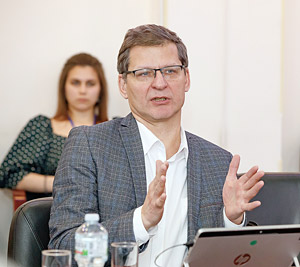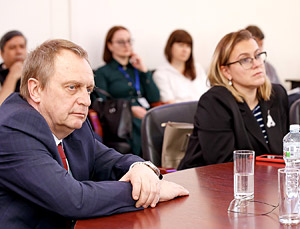
Electronic english version since 2022 |
The newspaper was founded in November 1957
| |
Conferences
MCE-2024 in Dubna: returning to traditions
31st International Conference "Mathematics. Computer. Education" has gathered its participants in Dubna. These interdisciplinary meetings bring together workers in science and higher education, aim to preserve the traditions of Russian science and education, as well as to attract young people to these areas.
"I'm glad to see you all, we haven't seen each other for four years," Chairman of the Conference Organizing Committee G.Yu.Riznichenko (MSU) greeted the participants. "We have held online conferences, but this is not the same at all, there is nothing better than personal communication. Thank you to everyone that came to Dubna! This is the 31st MCE Conference and the 15th one held in Dubna, Vladimir Korenkov is the main organizer of these conferences in Dubna, he has been with us from the very beginning."
"I'm glad that we once met Galina Yurievna and that she holds such wonderful conferences," the microphone passed to the Co-chairman of the Organizing Committee V.V.Korenkov (JINR). "There is no other conference like MCE. The Conference deals with almost everything: in addition to the stated topic, it also deals with the Russian language, the life of museums and Pushkin. This is the most interdisciplinary conference in the world."

G.Yu.Riznichenko and V.V.Korenkov are opening the conference
Academician of the Russian Academy of Sciences V.A.Matveev (JINR) has not once presented reports at MCE conferences.
"It is a great honor and a very pleasant privilege for me to welcome the participants of the Conference on behalf of our international Institute. I am very glad that we have gathered at Dubna University, like a big family, at home."
 |
| A.B.Rubin is talking about current issues of biophysics |
"Hosting a large conference is a lot of work and an honorable duty. I wish you all successful work," A.S.Denikin, Acting Rector of Dubna University that hosts the Conference within its walls concluded the introductory part of the conference.
In his report "JINR - an interdisciplinary complex of a Large research infrastructure (status and development prospects)" V.A.Matveev summed up some of the results of the seven-year period that has completed at the Joint Institute. "Today, it is clear that the solution to many tasks depends not on what funds are allocated for it, but on what talents and precisely young talents meet them." He emphasized that the information technology development strategy is aimed at addressing JINR's strategic objectives. The need for personnel resulted in the development of a branch of Moscow State University in Dubna that will also train information technology specialists. The JINR development strategy until 2030 is aimed at the comprehensive development of intellectual potential and strengthening the Institute as an international intergovernmental scientific organization.
A.B.Rubin spoke about current issues of biophysics in his report. A.S.Denikin introduced new educational strategies in training personnel for a knowledge-intensive economy. The personnel training programme at the Joint Institute was the topic of the speech by UC JINR Director D.V.Kamanin.
The same topic "International aspects of personnel training for major scientific projects" was continued at the round table. Opening it, A.S.Denikin noted that the task of attracting foreign students to Dubna had been during the establishment of the university and continues to this day. He called the joint double-degree training programme with Kazakhstan one of the best projects. It started in 2010 and to some extent, saved Kazakhstan's participation in JINR. As a result, today, the United Institute has the largest (over 100 people) national group from this republic. After the university had become a federal one, a programme for teaching Russian as a foreign language was launched and starting next year, the university will obtain quotas from the Ministry of Education and Science for training foreign students at the request of JINR.
V.V.Verkhoturova (Tomsk Polytechnic University) briefly outlined her report, made on the same day at the plenary session. According to UNESCO, more than 280 thousand foreign students studied in Russia in 2021 (75% from the CIS countries, 10% from India and China). At the end of 2022, many foreign educational organizations suspended cooperation with Russia and many joint educational programmes of Russian and foreign universities were suspended. The world is in a race for talent: from 2010 to 2020, the number of international students in the world increased from 3.5 million to 6.5 million and the possibilities of online learning are also overestimated. Network universities develop: 46 universities from 9 countries are part of the CIS network university, 78 universities are part of the SCO network university (India, Iran, Pakistan, Uzbekistan are going to join), 56 universities from 5 BRICS countries develop the network university of this organization.
About 30 universities from the top 100 of the QS ranking (one of the three well-known rankings of universities in the world) use nuclear reactors in their activities: Massachusetts Institute of Technology, University of Toronto, University of Tokyo, Technical University of Munich and others. The research nuclear reactor of Tomsk Polytechnic Institute IRT-T with a capacity of 6 MW is used to train specialists for nuclear fuel cycle enterprises. This is the only training nuclear reactor in Russia.
Here, research activities are carried out in two areas: medical engineering and neutron activation analysis. Silicon alloying is produced at the reactor and this is science, professional training and production at the same time. The university purchased a virtual radiation therapy simulation system. All educational, research and production potential, together with Rosatom, was assembled into an international centre for nuclear education and career support for foreign students. And the final touch to the Tomsk Polytechnic brand: today, six of the eleven directors of Russian nuclear power plants are graduates of this university.
"We are still waiting," Director of the JINR Information Centre in Vladivostok A.V.Reguzova shared her plans. "The synchrotron on Russky Island will be constructed only in 2027; to ensure its constant operation, 200 young scientists, engineers and IT specialists will be needed. A joint programme in medical physics currently runs with JINR and MEPhI and internships for students at the Joint Institute will be held. Over the two years of work of the information centre, more than 35 people have taken part in the practices of the UC JINR. The Far Eastern Federal University is aimed at the Asia-Pacific region, works with Chinese students, has a centre for teaching the Russian language and creates comfortable conditions for foreign students. Together with China, it is expected to organize a training programme in medical physics."
 |
| V.V.Karezin: "Rosatom is a partner" |
Rosatom proposes to organize an international nuclear education cluster in Obninsk to help universities. It will allow Russian universities to become more visible at the international level. Rather than promoting 10-15 Russian universities, for example, to Rwanda, it is more effective to collect all the best in one place and advertise this resource on the international market."
"I am absolutely sure that today, without focusing efforts of universities it is impossible to occupy the global educational niche," V.V.Karezin noted.
"We realized that we need to consolidate universities in order to bring them to international markets. "Project 5-100" of the Ministry of Education and Science (an attempt to bring at least five Russian universities to the level of the top 100 universities in the world that was not successful - O.T.) is not quite the right idea. We should not strive to become leaders in the ratings, but to occupy our share of the educational market, create competitive products and these are different tasks," V.V.Mitinskaya (Rusatom Overseas) said.
A.G.Olshevsky presented the 60-year history of the MSU branch in Dubna and the just begun history of the MSU branch. A.L.Tasevich shared her experience of developing an international master's programme in chemistry (bioenergy and biomass processing products) at the Faculty of Physical and Mathematical Sciences of RUDN University.
"Why are we interested in today's discussion?" P.A.Shvetsov (Rossotrudnichestvo) joined the conversation. "We administer a quota for 30 thousand foreign students from more than 170 countries. We have to answer a large number of their questions. Dubna can be talked about abroad as a good example in the field of education. Exporting education is not the sale of goods, but the promotion of a picture of the world, a look into the future."
"My report at the conference was aimed at the fact that we do not carry out much work here," V.V.Korenkov noted. "In order for a large international project to be held, infrastructure is needed. It is necessary not only for CERN and NICA, but also for all Russian megascience projects it is necessary to organize a unified IT infrastructure. This is an extremely difficult task. No one in Russia today trains specialists that can do it, not even leading universities. And these two issues are interconnected. MLIT JINR attracts the best students from universities in Russia and other countries, we develop IT infrastructure in other countries, but a targeted government policy in these matters is required. The Ministry of Education and Science does not pay attention to this issue; Rosatom should pay attention. It costs all CERN member countries $10 billion to construct the LHC and each country has already invested about the same amount in developing the IT infrastructure."
 |
| S.N.Nedelko took part in the round table |
H.Tanyildizi (Turkey) that has worked in BLTP JINR since 2007 and 2015, shared his thoughts with the participants. He voiced the issue of recognizing Russian academic degrees abroad. Special Representative of JINR Director for Educational Policy S.G.Harutyunyan noted that in research universities, unlike classical universities, they train specialists to order. For international cooperation, the best option is a network organization system, but it requires a joint training programme that satisfies everyone.
The round table was attended by employees and representatives of JINR national groups, conference participants and employees of the Dubna University.
(To be continued)
Olga TARANTINA,
photo by Elena PUZYNINA